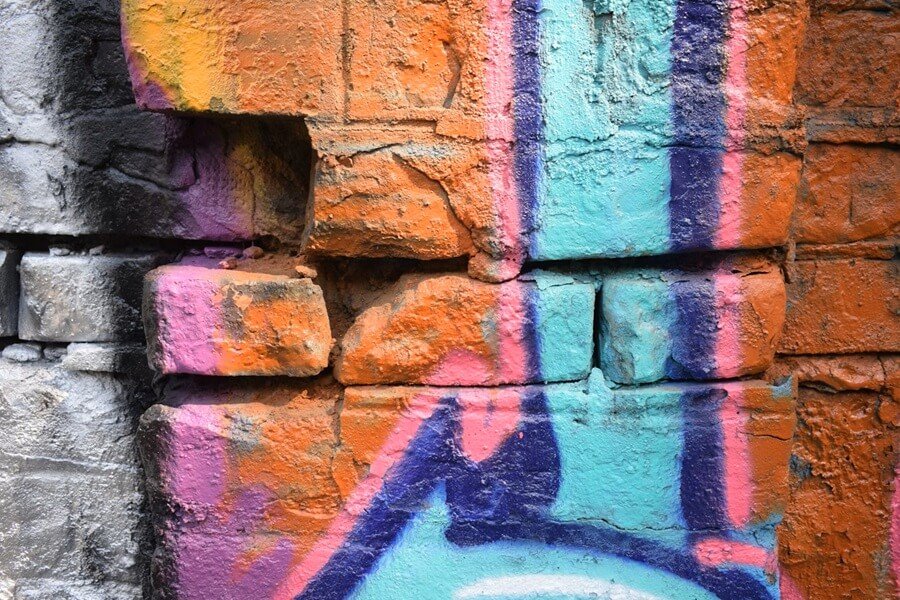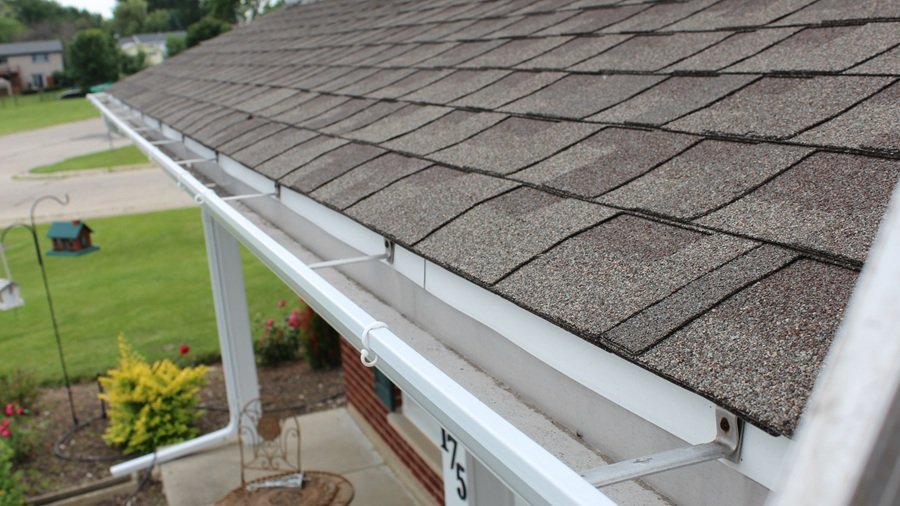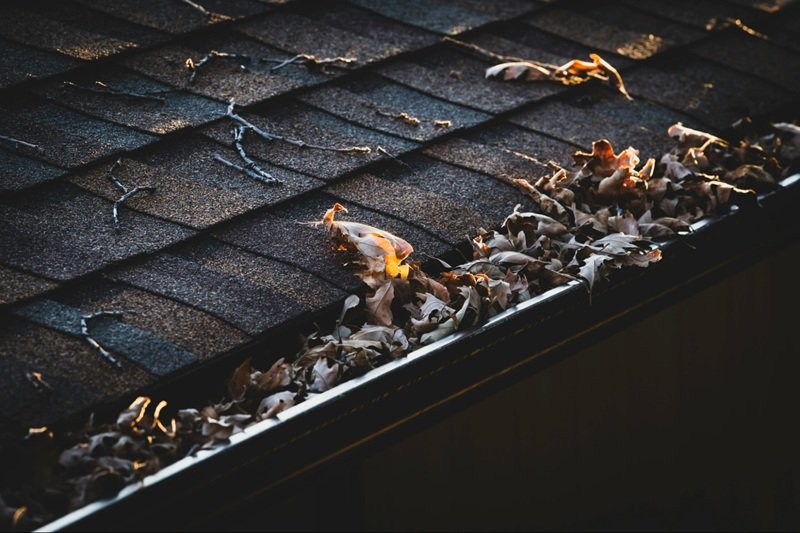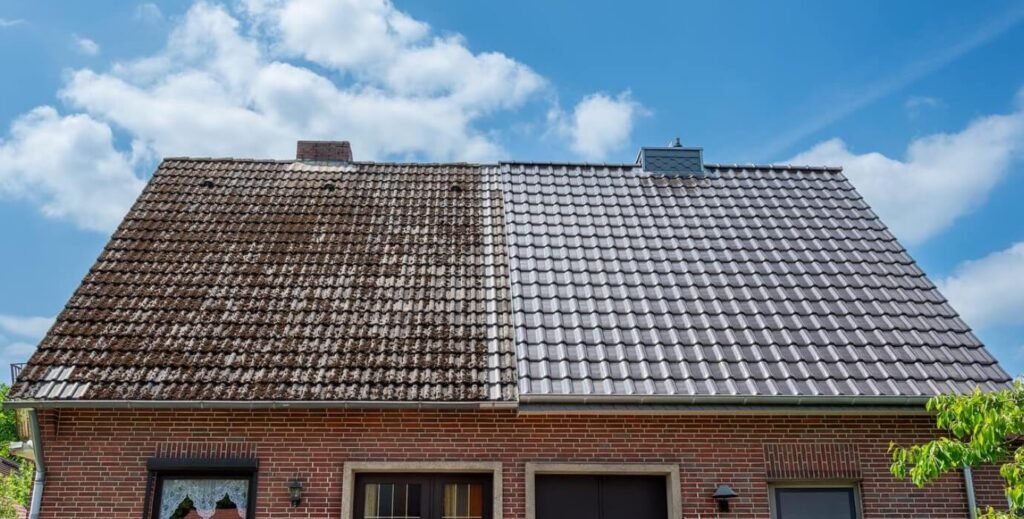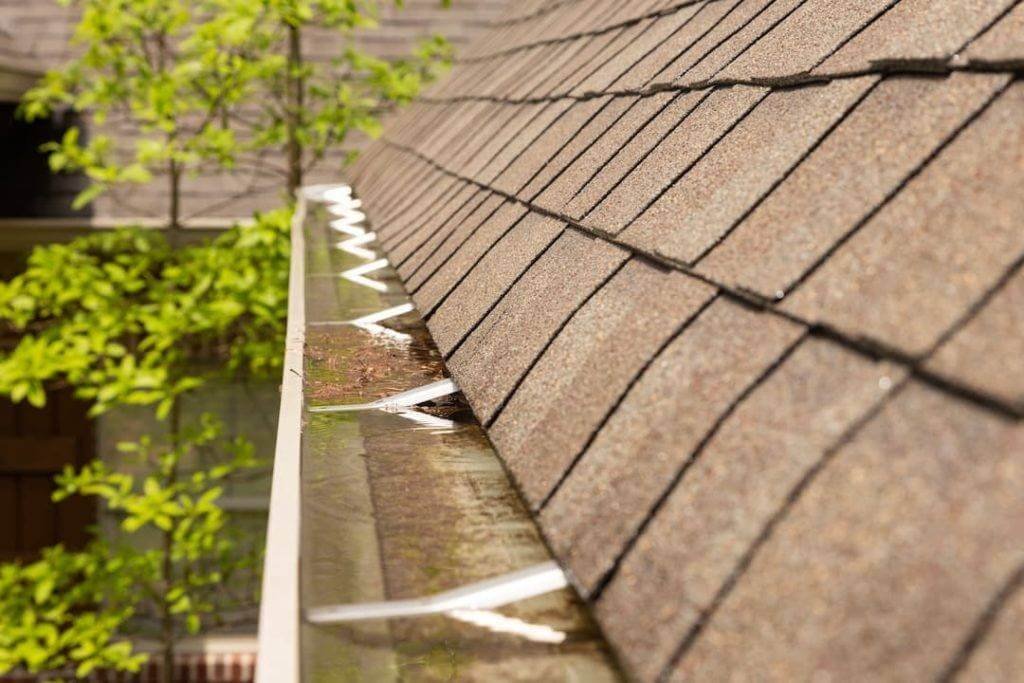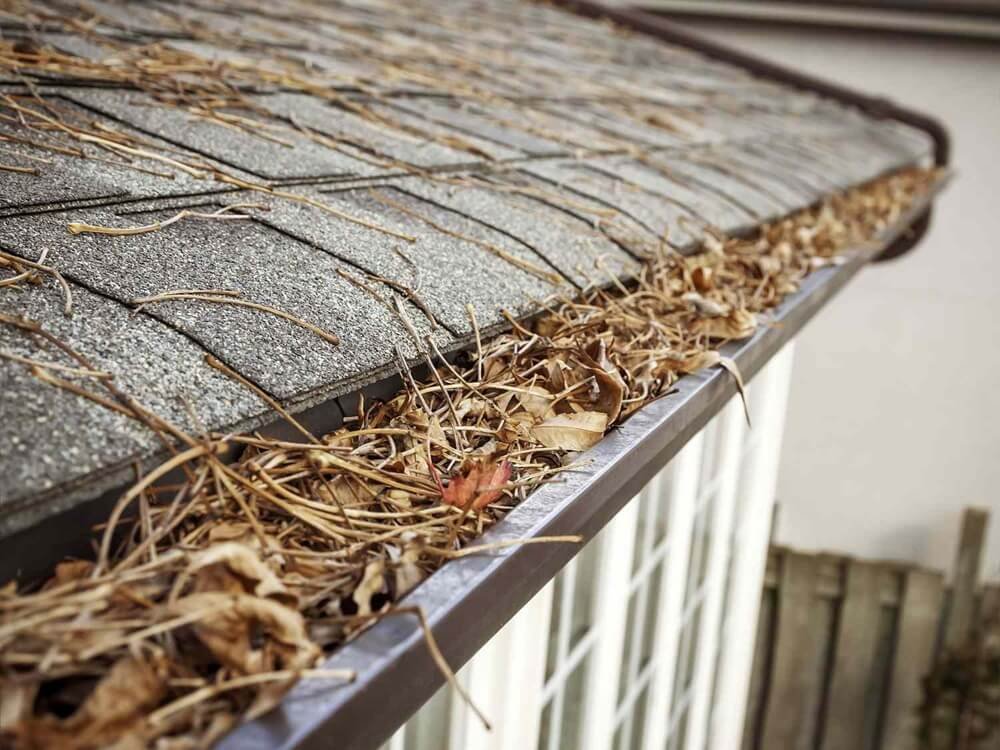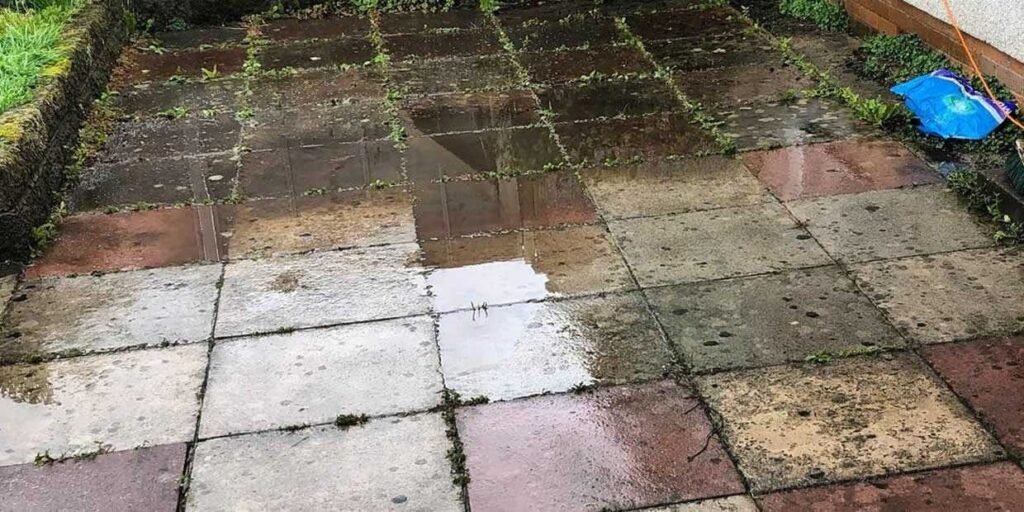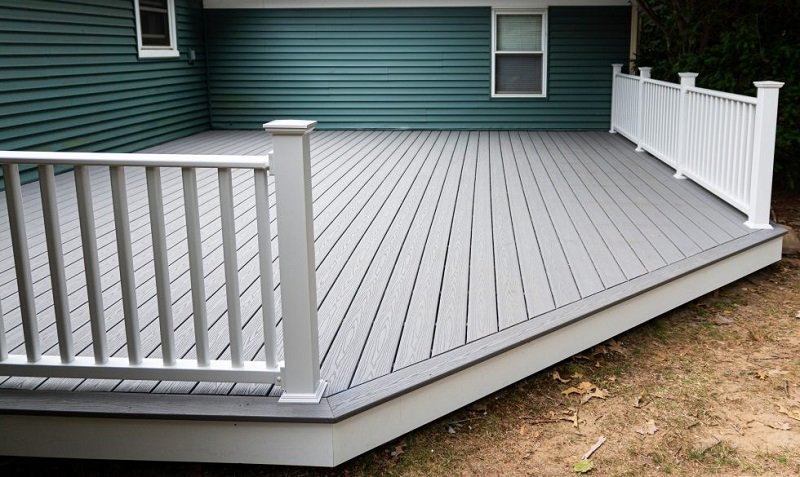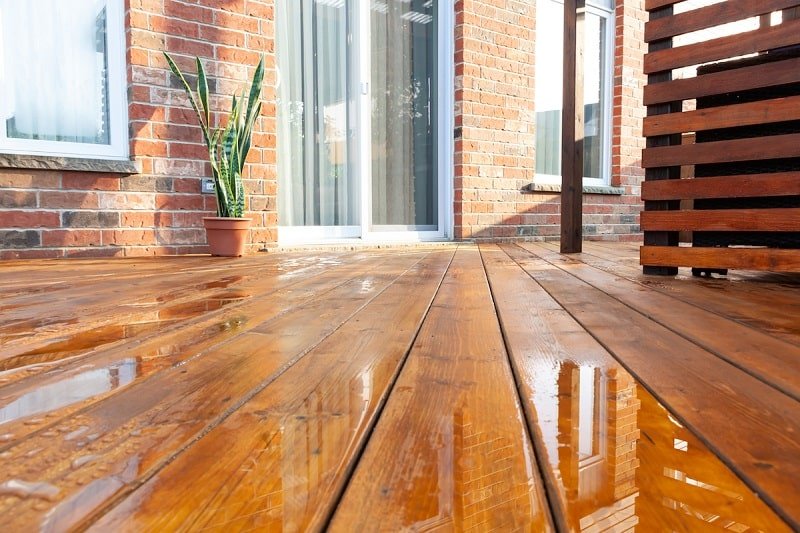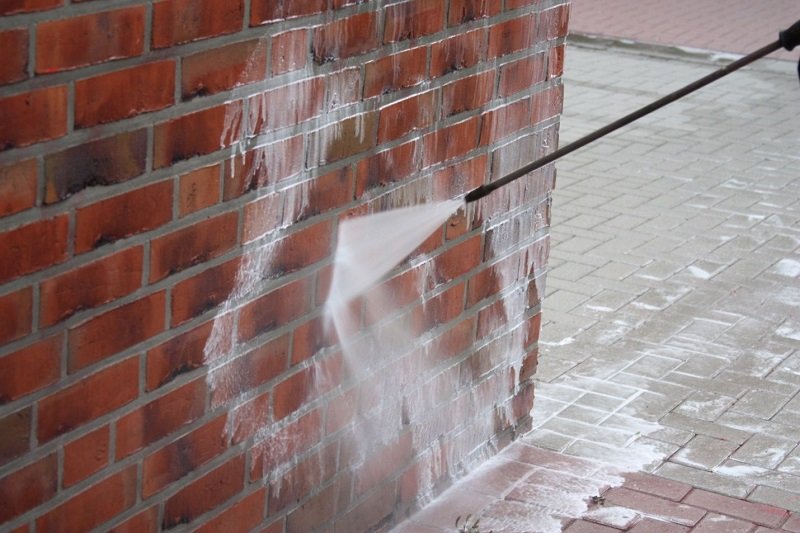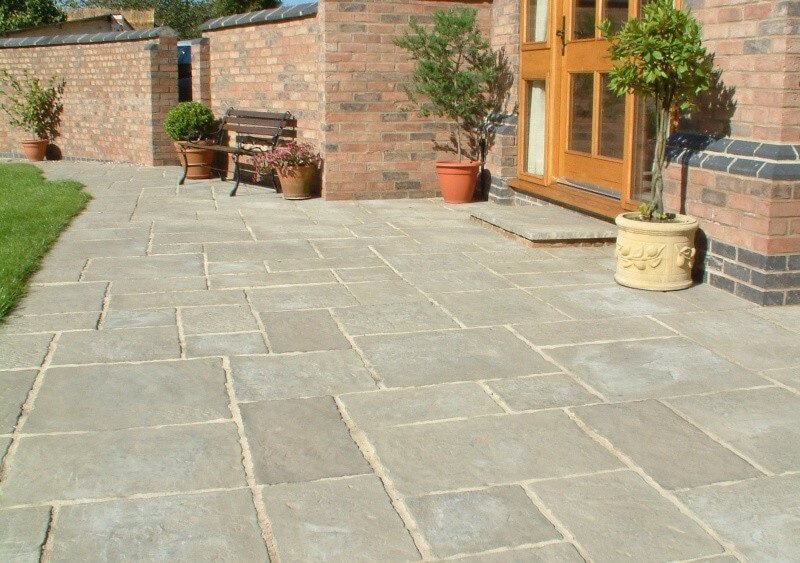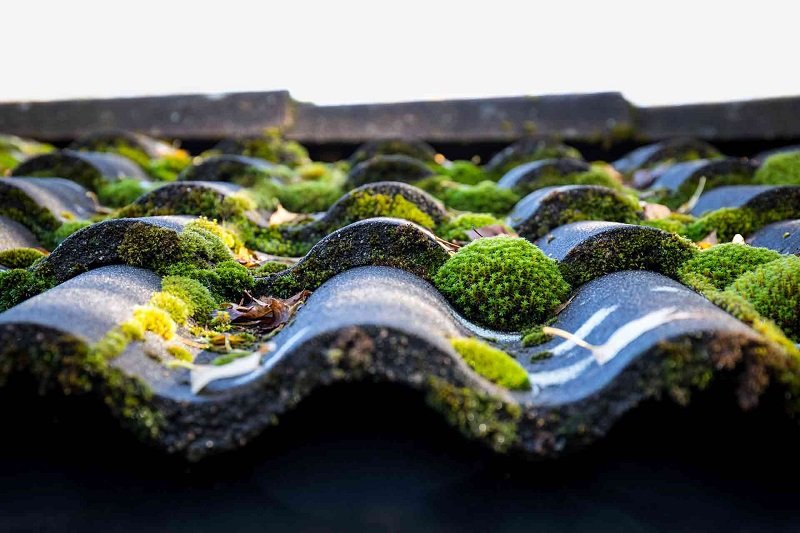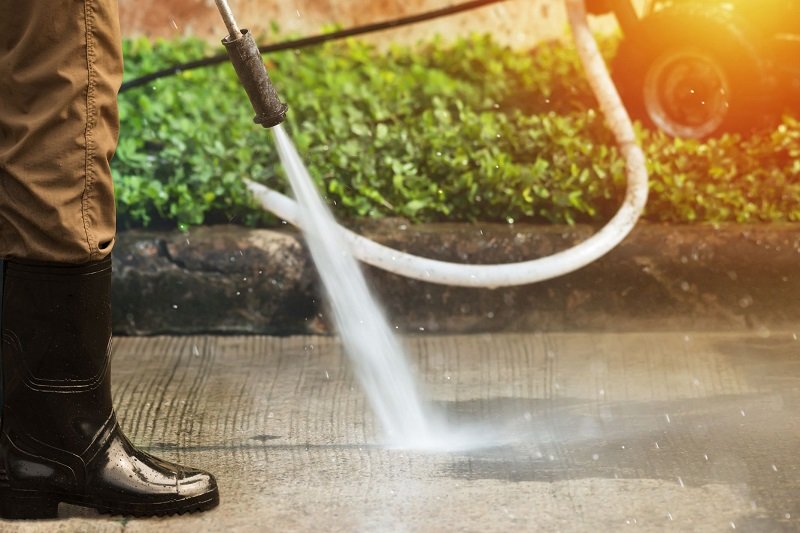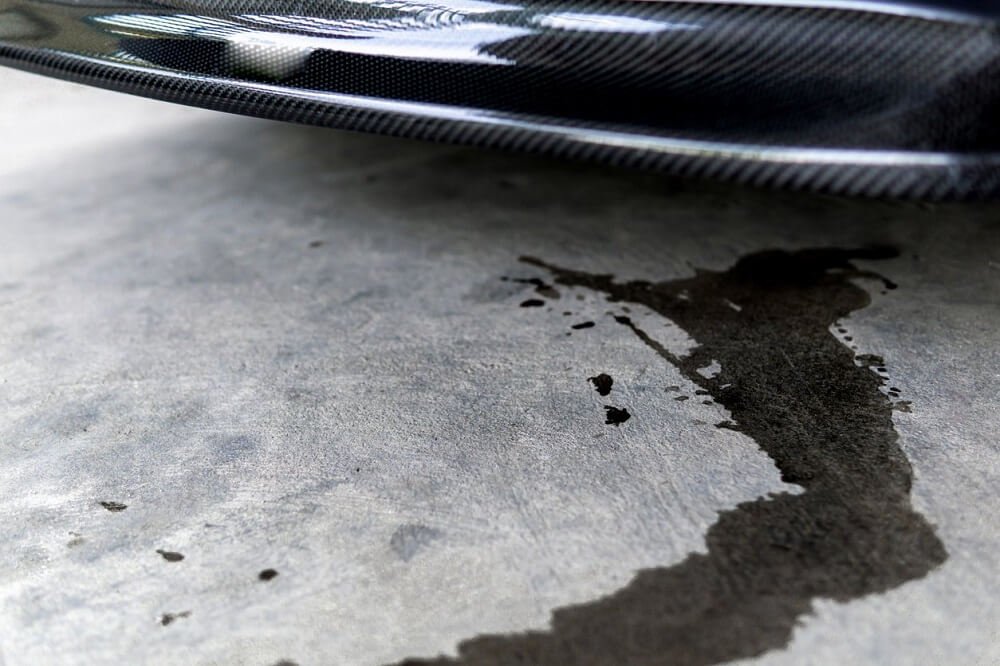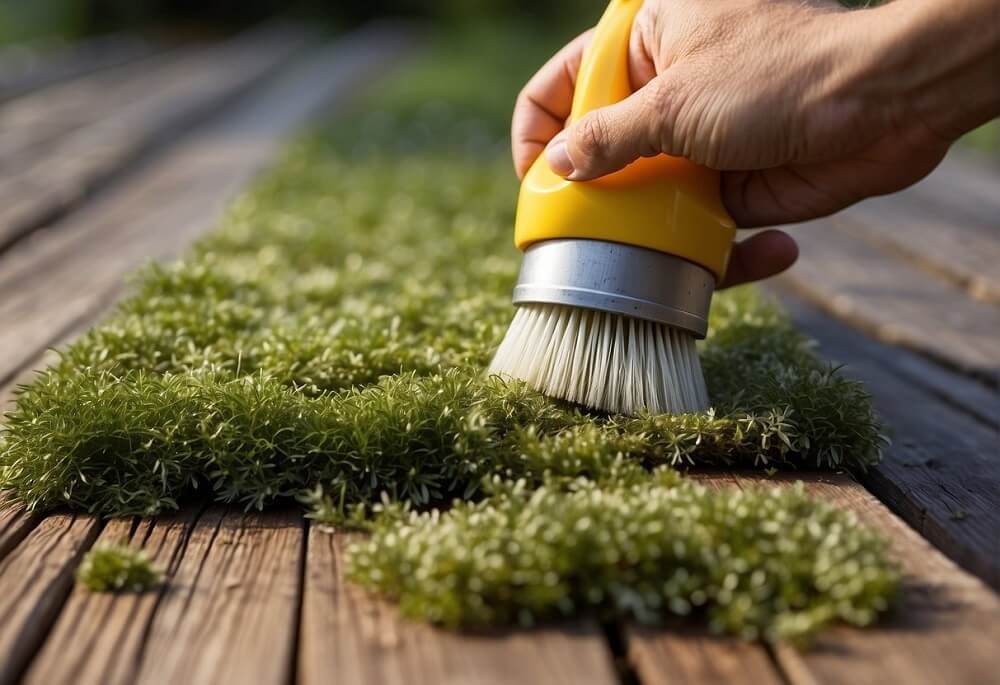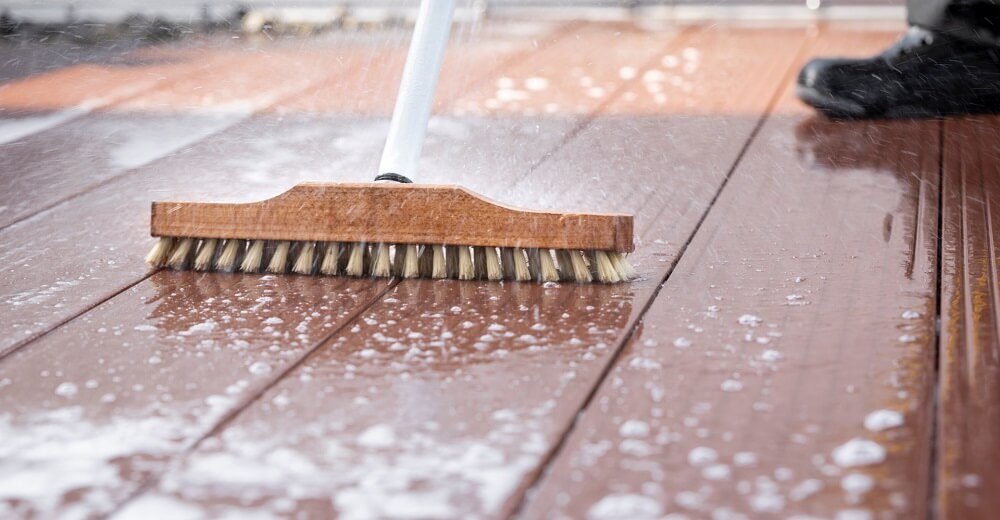Our Bristol team knows exactly how to treat and clean concrete safely, removing oil, dirt and stains the right way.
Your concrete driveway goes through a lot, cars, weather, dirt, oil, and everyday wear. Over time, all of this can leave it looking dull, stained, or even cracked. The good news is that with a little care and the right cleaning routine, you can keep your driveway looking fresh for years.
In this guide, we’ll show you how to clean and maintain a concrete driveway step by step. You’ll learn simple methods to remove stains, prevent damage, and protect the surface from the elements, all without needing professional help.
Whether you’re dealing with oil marks, mold or just years of buildup, these easy maintenance tips will help you bring your driveway back to life and keep it looking like new.
Why cleaning your concrete driveway is important
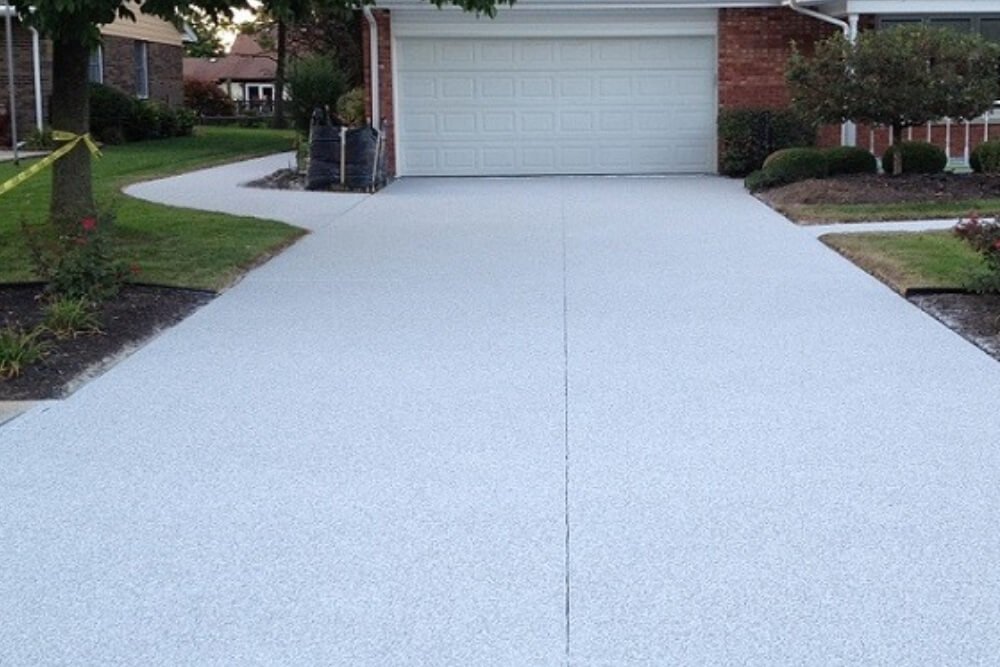
Your driveway is one of the first things people notice when they see your home. But beyond appearances, keeping your concrete driveway clean is about more than just curb appeal, it’s also about protection and longevity.
Concrete might look strong and low-maintenance, but it’s actually quite porous. That means oil, dirt, and moisture can seep in over time, leading to dark stains, cracks, and even structural damage if left untreated. Regular cleaning helps prevent those issues before they start.
Here’s why it really matters to keep your driveway clean:
– Prevents long-term damage.
– Avoids permanent stains.
– Improves safety.
– Boosts curb appeal.
– Extends the lifespan of your concrete.
Taking the time to clean your driveway regularly is one of the simplest ways to protect your investment and keep your home looking its best.
Common types of stains and contaminants
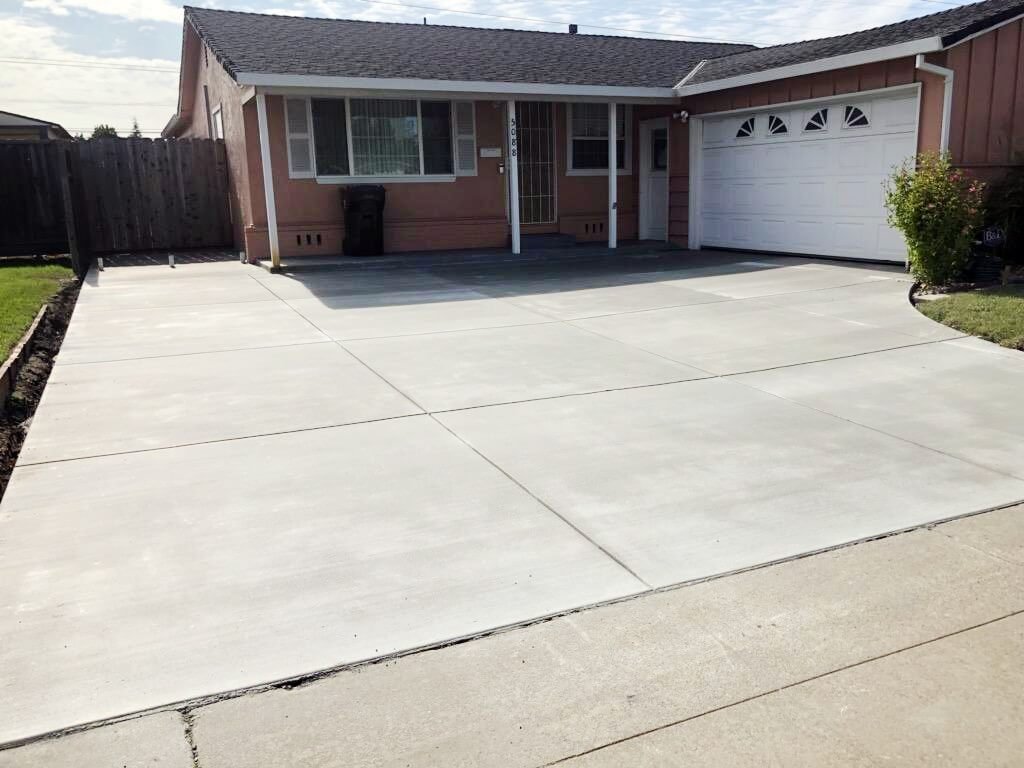
Even the toughest concrete driveways aren’t immune to stains. Over time, exposure to cars, weather, and daily activity can leave marks that are both unsightly and difficult to remove. Knowing what you’re dealing with helps you choose the right cleaning method and prevents making the problem worse.
Here are the most common types of stains and contaminants you’ll find on a concrete driveway:
Oil and grease stains. Usually caused by parked cars or small leaks. They penetrate deep into the concrete’s pores and can leave dark, stubborn patches if not cleaned quickly.
Rust stains. Often appear under metal furniture, tools, or garden equipment. These stains have an orange-brown tint and can be tricky to remove without the right cleaner.
Mold, mildew and algae. Common in shaded or damp areas. Besides looking unpleasant, they can make the surface slippery and unsafe.
Tire marks. Friction and heat from tires can leave gray or black streaks that don’t wash away easily with water alone.
Dirt and mud buildup. Over time, simple dust, mud, and organic matter can dull the concrete’s color and create a grimy film on the surface.
Chemical or fertilizer stains. If you use lawn treatments or de-icing salts, they can react with concrete and cause discoloration or surface damage.
How to clean a concrete driveway
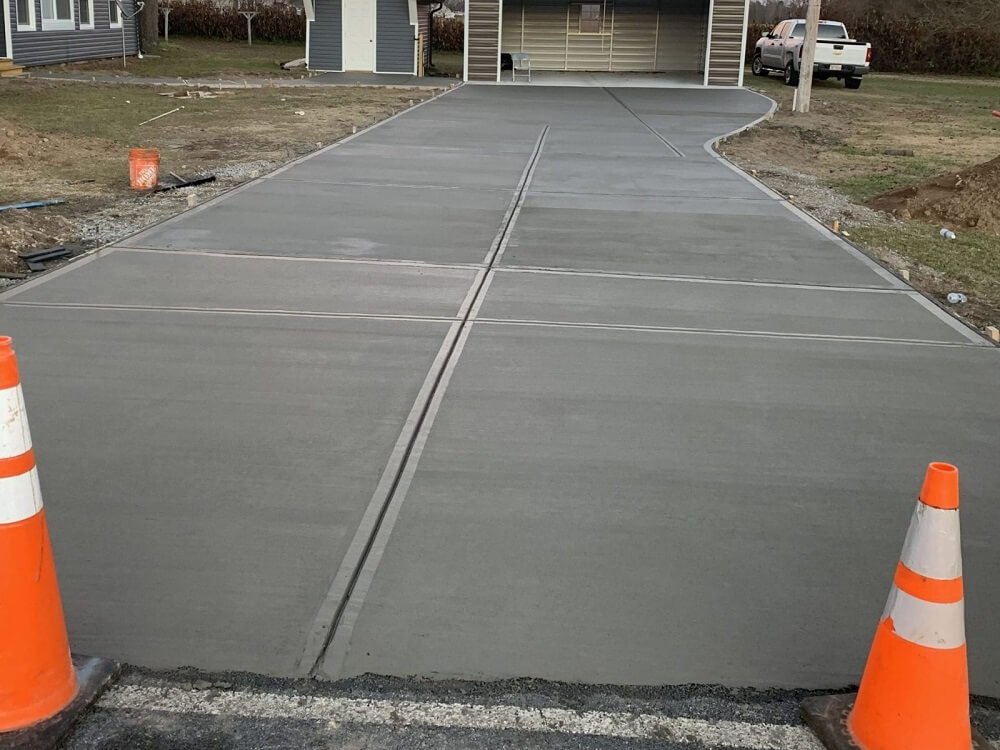
Cleaning your concrete driveway the right way can make it look almost brand new again and help it last for years. Follow these simple steps to get the best results without damaging the surface.
Clear and prepare the area
Start by removing everything from the driveway, cars, tools, pots, furniture, and anything else that might get in the way. Sweep away leaves, dust, and loose dirt with a stiff broom or leaf blower.
If there are plants, walls, or wooden fences nearby, cover them with plastic sheeting to protect them from splashes of detergent or debris during cleaning.
Target stains before washing
Before you start washing, treat any visible stains. Concrete is porous, so oil, rust, or grease can sink deep into the surface.
Use a degreaser for oil stains, a rust remover for metal marks, and baking soda or vinegar for lighter spots. Apply the cleaner directly to the stain and let it sit for 10-15 minutes before scrubbing.
Apply a suitable cleaning solution
Mix a concrete-safe cleaning solution, this can be a mild detergent, a specialized driveway cleaner, or a homemade mix of water, baking soda, and dish soap.
Apply the solution evenly over the surface using a pump sprayer or watering can, making sure to cover all areas (not just the stained ones). Let it sit for several minutes to loosen dirt and grime.
Clean using pressure or manual scrubbing
For large driveways, a pressure washer is the most efficient option. Use medium pressure and keep the nozzle at a consistent distance to avoid leaving marks.
If you don’t have a pressure washer, a stiff-bristled brush and some elbow grease will do the trick. Scrub in circular motions to lift dirt from the pores of the concrete.
Rinse thoroughly & check
Once the surface has been scrubbed, rinse thoroughly with clean water, preferably using a garden hose or the low-pressure setting on your washer.
Check for any areas that still look dirty or stained and repeat spot treatments if needed.
Allow the driveway to dry fully
Let the driveway dry completely before walking or parking on it, ideally for 24 hours. This helps prevent new dirt or tire marks from sticking to the damp surface. Once dry, you can also apply a concrete sealer to protect against future stains, moisture, and weather damage.
Main methods of concrete driveway cleaning
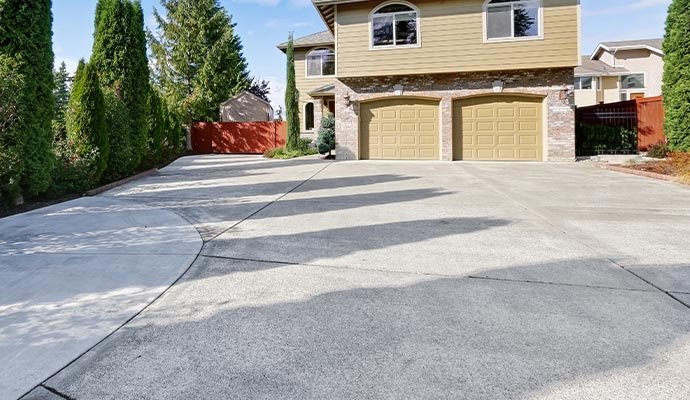
There isn’t just one right way to clean a concrete driveway, the method you choose depends on how dirty it is, what type of stains you’re dealing with, and how much effort you want to put in. Below are the most effective cleaning approaches, from quick DIY methods to professional deep cleaning.
Manual cleaning (Basic maintenance)
For regular upkeep and light dirt, manual cleaning is usually enough. All you need is a stiff brush, warm water, and a mild detergent.
Scrub the surface in circular motions, focusing on areas where grime or small oil spots tend to collect. This method helps prevent buildup and keeps your driveway looking tidy week to week.
Best for: routine cleaning, small driveways, or areas with light dirt and dust.
Pressure washing (Deep cleaning)
When the surface is heavily stained or covered in years of grime, pressure washing is the most effective way to bring your concrete back to life. The high-pressure water removes deep-seated dirt, algae, and even tough oil stains.
If you use a pressure washer at home, start with a medium pressure setting and test on a small section first. Avoid getting too close to the surface to prevent etching the concrete.
Best for: annual cleaning, large driveways, and heavily soiled areas.
Cleaning solutions & chemicals (For stubborn stains)
Some stains, especially oil, grease or rust need more than water to disappear. In those cases, you can use concrete-safe cleaning products such as degreasers, rust removers, or enzyme-based cleaners.
Always read the label and test on a small patch first. Avoid using bleach or acids unless they’re specifically designed for concrete, as they can cause discoloration or surface damage.
Best for: targeted stain removal and deep cleaning specific areas.
Eco-friendly & natural methods (Gentle cleaning options)
If you prefer to avoid harsh chemicals, try a natural cleaning mix using everyday ingredients like baking soda, vinegar, and warm water.
This combination works well for surface-level dirt, light oil marks, or organic stains like mold or algae. It’s safe for plants, pets, and the environment, perfect for households that value sustainability.
Best for: light cleaning, maintenance and environmentally conscious homeowners.
Professional cleaning services (When you want it done properly)
Sometimes, the best way to restore your driveway is to let the professionals handle it. Companies like Bristol Blast Away specialize in professional driveway cleaning, using industrial-grade pressure washers and advanced cleaning agents that go far beyond what standard home tools can achieve.
Their trained team knows how to adjust pressure levels and cleaning solutions for each surface, whether it’s concrete, paving stones or decorative slabs ensuring a deep clean without damage.
A professional service like Bristol Blast Away can:
Remove deep, long-standing stains that DIY methods can’t touch.
Clean large areas quickly and evenly.
Apply protective sealants to help prevent future staining.
Restore your driveway’s original color and texture.
Best for: old, heavily stained driveways, or whenever you want flawless results with zero effort.
If you’re in or around Bristol, a quick call to Bristol Blast Away can save you hours of scrubbing and bring your driveway back to life
What to avoid when cleaning a concrete driveway

Cleaning a concrete driveway may seem simple, but using the wrong products or techniques can do more harm than good. To keep your surface in great shape and avoid costly repairs, here are the most common mistakes to stay away from.
1. Using harsh acids or bleach
Strong chemicals like muriatic acid or undiluted bleach can damage the top layer of your concrete, leading to discoloration and rough patches. Always choose cleaners that are labeled safe for concrete or use mild, eco-friendly alternatives.
2. Applying too much pressure
While pressure washers are effective, using an extremely high setting can etch the concrete, leaving permanent marks or uneven patches. Always start on a lower pressure and move in steady, consistent motions.
3. Ignoring nearby plants or surfaces
Cleaning agents and runoff water can harm plants, lawns, or painted surfaces. Cover nearby areas with plastic sheeting or rinse them with clean water before and after washing to reduce damage.
4. Skipping pre-treatment of stains
If you go straight to washing without targeting deep oil or rust stains first, you’ll likely just spread the dirt around. Always treat problem areas with a suitable cleaner or degreaser before general washing.
5. Cleaning during extreme temperatures
Avoid cleaning when it’s too hot or freezing outside. In high heat, cleaners can dry too fast and leave streaks; in cold weather, water can freeze and cause cracks in the concrete. Mild, dry days are best for a thorough clean.
6. Forgetting to rinse thoroughly
Leaving cleaning products or residue on the driveway can lead to streaks, white patches, or even surface erosion over time. Always rinse generously with clean water once you’ve finished scrubbing or pressure washing.
7. Skipping regular maintenance
A single cleaning session isn’t enough to keep your driveway in good shape long-term. Dirt and oil build up gradually, so try to clean lightly every few weeks and schedule a deep wash once or twice a year.
Avoiding these common mistakes ensures your concrete driveway stays strong, stain-free and visually appealing for years to come.
How to keep your concrete driveway looking new

Once your concrete driveway is clean and fresh, keeping it that way comes down to a few simple maintenance habits. Regular care not only preserves its appearance but also extends its lifespan, saving you from future repairs or resurfacing.
1. Clean small messes right away
Don’t wait for stains to settle. Whether it’s oil, mud, or leaves, cleaning spills immediately prevents them from seeping into the concrete and leaving permanent marks.
2. Rinse regularly
A quick rinse every couple of weeks helps wash away dirt, dust, and small debris that can dull the surface over time. It also keeps weeds or algae from forming in cracks or corners.
3. Reapply a protective sealant
Concrete sealers create a barrier against water, oil, and chemicals. For best results, reapply every 1-2 years, or sooner if your driveway gets heavy use. A good sealant also enhances color and gives the surface a clean, finished look.
4. Avoid parking heavy vehicles in the same spot
Repeated weight on one area can cause stress and cracks over time. Try rotating where you park larger vehicles or trailers to distribute the load evenly.
5. Keep gutters and edges clear
Standing water can lead to erosion or staining. Make sure your drainage system and driveway edges stay clean so rainwater flows away easily.
6. Schedule a professional clean once a year
Even with regular upkeep, a professional driveway cleaning service like Bristol Blast Away can remove buildup you might miss. Their specialized equipment and sealant options help maintain that “just cleaned” look all year round.
By combining regular cleaning, protective sealing, and occasional professional maintenance, you can keep your concrete driveway looking smooth, spotless, and almost brand new for years to come.
Common questions about cleaning concrete driveways

Keeping your driveway clean might seem simple, but once you start, a lot of small questions tend to pop up, what products to use, how often to clean, or whether pressure washing can cause damage. To make things easier, we’ve gathered some of the most common questions homeowners ask about concrete driveway cleaning and answered them below.
1. What’s the best way to clean a concrete driveway without damaging it?
The safest and most effective method is to use warm water, a mild detergent, and a stiff brush. For larger areas or deeper grime, you can use a pressure washer on medium pressure, just make sure to keep the nozzle moving and avoid focusing on one spot too long.
2. Can I use a pressure washer on concrete, or will it cause cracks?
Yes, you can, as long as the concrete is in good condition. Stick to 2,500-3,000 PSI, and don’t get too close to the surface. Cracks are more often caused by pre-existing damage or high pressure, not by proper cleaning.
3. Do cleaning chemicals affect nearby grass or plants?
Some strong degreasers and acidic products can harm your lawn or flowers. To avoid that, choose biodegradable or plant-safe cleaning products, and always rinse your plants with clean water before and after washing the driveway.
4. How often should a concrete driveway be cleaned?
Light cleaning every month or two keeps things under control, while a deep clean once or twice a year helps prevent permanent staining and wear.
5. What’s the best time of year to clean a concrete driveway?
Spring or early summer is ideal, temperatures are mild, and surfaces dry quickly. Avoid very hot or freezing days, since both can affect how cleaning solutions work.
6. Is it worth paying for a professional driveway clean instead of doing it myself?
If your driveway just has surface dust or a few spots, DIY cleaning works fine. But for old, deep stains or large surfaces, it’s worth calling a professional like Bristol Blast Away. They use powerful pressure washers, industrial cleaners, and protective sealants that restore concrete safely and efficiently.
Cleaning and maintaining your concrete driveway isn’t complicated once you know what to do, but small mistakes or neglect can shorten its life. With the right care and occasional help from professionals, you can keep your driveway looking great year-round.
If you want more practical advice on driveway cleaning, maintenance tips, and eco-friendly solutions, explore our latest guides on the Bristol Blast Away Blog, you’ll find detailed answers to even more common questions from homeowners like you.


